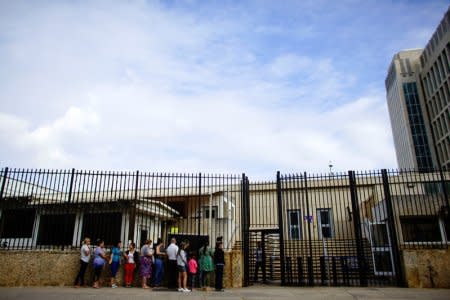Desperate Cubans seek U.S. visas in Colombia after Havana embassy cutbacks

Thomson Reuters
By Nelson Acosta
HAVANA (Reuters) - Cuban actress Aniet Hernandez lost all hope that she and her two children would ever join her husband in Miami when the Trump administration slashed staffing at the U.S. embassy in Havana in September and stopped almost all visa processing.
"When I heard the news, I thought my marriage was over, that my family was being destroyed," said the 35-year old, whose husband emigrated four years ago to seek "a better future".
A few weeks after its announcement, the United States said it would process Cuban family reunification requests at its Bogota embassy instead, sparking both relief and frustration on the Communist-run island.
Bogota, the capital of Colombia, is an approximate three hour flight from Havana, and Colombia requires Cuban visitors to obtain visas.
So Hernandez is now one of hundreds of Cubans seeking visas at the Colombian embassy in Havana in order to fly to Bogota for two to three weeks for interviews at the U.S. embassy - an extra layer of cost and bureaucracy in an already complex affair.
"This whole process is quite stressful," said Hernandez.
The once-quiet villa that houses the Colombian embassy in the plush Miramar suburb of Havana is a hub of activity as Cubans line up outside from dawn until dusk, sheltering from the sun and rain under umbrellas and trees.
Colombian consul Luis Fernando Cordoba said his team was working much longer hours than usual and getting back-up to cope with higher demand for visas.
"These are people who have spent two to three years without their families so we want to give them support," Cordoba said. "It's a delicate situation."
Given the average state wage in Cuba is $30 per month, those waiting outside the embassy said the requirement of at least $2,000 in a bank account for the Colombian visa was onerous.
Their families in the United States had lent them that money as well as shouldered other costs, they said.
Those included around $170 for the Colombian visa, plus flights to Bogota and multi-week hotel stay, with the risk it might all be a waste of time if the United States denied them immigrant status.
"It's a whole lot of money to spend, about $4,000 in total to be reunited with my family," said Mercedes Cespedes, 78, who has been waiting for a year and half to join her brother in Michigan. "This is pretty abusive because political situations shouldn't interfere in Cuban families."
DETERIORATING RELATIONSHIP
The Cuban-U.S. relationship, which former Democrat U.S. President Barack Obama had sought to normalize after decades of Cold War conflict, has steadily deteriorated since Republican Donald Trump took office, impacting families divided by the Florida Straits.
While Cuba's population numbers around 11 million, there are an estimated 2 million Cubans or Americans of Cuban origin in the United States.
The United States has a deal with Cuba to issue 20,000 U.S. visas a year to Cubans seeking to emigrate, agreed after a 1994 rafter exodus to prevent them from taking to the sea illegally in makeshift craft.
Washington issued more than 800 immigrant visas to Cubans per month from March to August last year, State Department data shows, but just 168 in September, 16 in October and 196 in November in the wake of the scaling back of its Havana embassy.
The Trump administration said it had no choice but to reduce staffing, given it believed two dozen of its diplomats and family members in Havana had been sickened in a mysterious spate of attacks.
A U.S. official told Reuters last week the government will not send staff back yet.
Critics say Washington politicized a complicated matter. Canada reported similar health problems among its staff in Havana but, given the lack of evidence about the cause, has not shrunk its embassy.
Cordoba said Colombia was doing all it could to help Cuban families and has not rejected a single visa request from Cubans to travel to Bogota for interviews at the U.S. embassy.
In the line of applicants, Delio Sotolongo said he had come from the central province of Villa Clara, 250 km (155 miles) away. Given his monthly salary of $15 as an accountant, his wife in Miami was paying all the fees.
"We need to be optimistic now," the 50-year old said, "and think that we will finally manage to join our families again."
(Reporting by Nelson Acosta in Havana; Additional Reporting by Grant Smith in New York; Writing by Sarah Marsh; Editing by Daniel Flynn and Rosalba O'Brien)
See Also:

 Yahoo News
Yahoo News 
